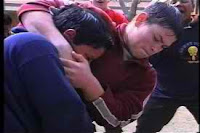Aspergers versus Nonverbal Learning Disorder: What’s the Difference?

Question My 4-year-old was diagnosed with Aspergers a month ago. I went for a second opinion, and that doctor doesn’t think she has Aspergers – he thinks it is NVLD. So I was reading about them and I understand that they are very similar (except that with AS, they have obsessions). My daughter does not have anything she is obsessed with, but she does need structure and routine throughout the day to regulate herself. My daughter also has Sensory Integration Disorder, which from what I understand can coexist with AS. I don’t know if I should get a 3rd opinion or just keep the Aspergers diagnosis so she can get services in school. The doctor that says he thinks it is NVLD said that Aspergers usually isn’t diagnosed until age 5 or 6, which I don’t think is true. I am just looking for your input. Answer There is often confusion between Aspergers (high functioning autism) and Nonverbal Learning Disabilities (NLD). In fact, sometimes these two terms are mistakenly used interchan
